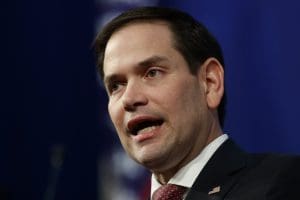Marco Rubio completely misses the point of the GM strike
Tens of thousands of UAW workers are demanding higher wages and affordable health care. But the Republican senator from Florida says it’s about ‘America First.’

Last week, 49,000 General Motors workers who are members of the United Automobile Workers — the labor union representing hundreds of thousands of automobile, aerospace, and agricultural implement workers — went on strike. Their demands include fair wages, affordable health care, profit-sharing, job security, and a path to permanent seniority for temporary workers.
Sen. Marco Rubio (R-FL) has spent much of his career fighting against all of those things. He has opposed raising the minimum wage to $9 an hour. He has repeatedly voted to repeal the Affordable Care Act, even supporting a repeal with no replacement. And he has supported efforts to undermine labor unions, earning a lifetime score from the AFL-CIO of just 7 out of 100 with his anti-worker record.
In a Detroit Free Press op-ed on Tuesday, Rubio tried to argue that the strike was really about Donald Trump’s America First agenda while ignoring the real objectives of workers.
After noting that he was “not a participant in either side of the strike” nor “in a position to mediate who is right or wrong on each item being negotiated,” Rubio still felt compelled to weigh in with more than 700 words — few of them remotely related to the actual conflict.
First, he lamented that global companies are too busy trying to make money to invest in America and suggested, contrary to all statements from the actual striking workers, that was the “core” issue:
For companies like GM, national obligation is a more complicated affair. GM is one of the great icons of American innovation. But the world is a very different place than it was 111 years ago when William Durant, who made his money building horse-drawn carriages, first incorporated the company. Its customers and supply chains are global, as is its competition. Companies face immense pressure from shareholders to generate short-term returns — pressure that sometimes eclipses the need to invest in America’s future.
This difference in how we conceptualize national obligation is at the core of today’s labor strike, and it will remain even after the UAW and GM reach a deal.
Next, Rubio seemed to suggest that the strike, Elizabeth Warren’s agenda, and Trumpism are really about putting America ahead of what’s good for the world:
We see this difference play out in many of today’s political battles. A new consensus is emerging that says America’s companies should act in America’s national interest, as opposed to a global interest or the interests of their shareholders only. President Trump’s “America First” message carried him to the White House, and Elizabeth Warren is making “Economic Patriotism” a centerpiece of her presidential run.
Those messages resonate with the American people because they speak to Americans’ growing concern over the destabilizing effects of technological change and broad financialization at home. In the face of a predatory China — a country whose leaders aggressively seek to destroy our industrial base and allow businesses to flagrantly steal American intellectual property — the need for solutions has become even more urgent.
Finally, Rubio concludes by proposing a litany of tax code revisions that are not being sought by workers. Among his solutions to help workers are “full-expensing: how to expand and make permanent the immediate write-off for any business investment in machinery, structures, and land” and “reduce existing tax code incentives for companies to buy back their own shares.”
Rubio has received thousands of dollars worth of campaign contributions from the GM corporate political action committee. He also opposed the Obama administration’s wildly successful efforts to save the automobile industry, arguing: “I don’t think that was the right way to handle it, but certainly our auto industry is important. Again, it was a problematic approach that the federal government took to doing it.”
Published with permission of The American Independent Foundation.
Recommended

Biden calls for expanded child tax credit, taxes on wealthy in $7.2 trillion budget plan
President Joe Biden released his budget request for the upcoming fiscal year Monday, calling on Congress to stick to the spending agreement brokered last year and to revamp tax laws so that the “wealthy pay their fair share.”
By Jennifer Shutt, States Newsroom - March 11, 2024
December jobs report: Wages up, hiring steady as job market ends year strong
Friday’s jobs data showed a strong, resilient U.S. labor market with wages outpacing inflation — welcome news for Americans hoping to have more purchasing power in 2024.
By Casey Quinlan - January 05, 2024
Biden’s infrastructure law is boosting Nevada’s economy. Sam Brown opposed it.
The Nevada Republican U.S. Senate hopeful also spoke out against a rail project projected to create thousands of union jobs
By Jesse Valentine - November 15, 2023














































































